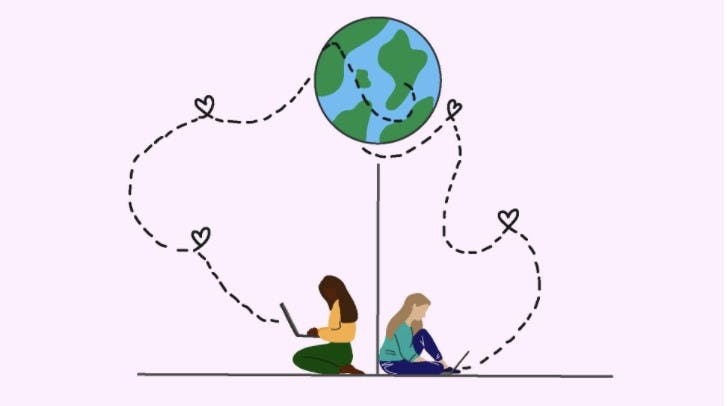The pressures of the college lifestyle can be rough on any relationship. Between long days of classes, rigorous studying and the added implications of college party culture, being in a relationship as a student is difficult.
If that weren’t enough, some students add another element into the equation: living hours away from their partner.
English sophomore Madeleine North is in a long-distance relationship with her boyfriend, who attends Michigan Technological University, a seven-hour drive from MSU.
“We look forward to breaks between college,” North said. “Winter break, spring break, all that type of stuff. Those are kind of like the countdown points, the light at the end of the tunnel.”
In between breaks, North and her partner find ways to keep the romance alive.
“We do virtual dates all the time,” North said. “Discord is our best friend, video calls, we use those things like Netflix Party and things like that to have our little dates.”
Psychology senior Taylor Kovach has been in several long-distance relationships, some of which took place exclusively online. As she discovered her sexuality, she struggled to find people close to her who were also a part of the LGBTQ+ community.
“Being gay, there’s not a lot of people in Michigan to date,” Kovach said. “You have to date online. That’s kind of the only thing you can do. I’m from a small town, and there weren't that many ‘out’ people.”
Kovach met her current girlfriend online. Though they have now closed the distance between them, they were a long-distance couple at first. Kovach said she got to know her partner in reverse — she learned all of the deep problems and traumas that are typically exposed later before she could meet her in person.
“You have to have that really good foundation and intimacy,” Kovach said. “All the ways you can’t get physically intimate, you’re going to get emotionally intimate, very emotionally intimate.”
Kovach noted there are some upsides to not being able to be physically intimate with your partner.
“You know each other on a very deep level before you do any of the physical stuff,” Kovach said. “That makes the physical stuff way more worth it by the time that comes.”
Kovach serves as proof; with communication and trust, a relationship can prevail over a long distance.
“(We are) engaged and we have animals together and, in the future, we’re planning on having kids,” Kovach said. “We’re very happy. We’re very good together.”
Licensed sex therapist and MSU social work professor Tina Timm has counseled couples for nearly 30 years. She said, while difficult, it’s possible to have a rewarding relationship with someone who is not physically present.
In order to make long-distance work, Timm said it’s important for couples to have conversations about what their expectations and boundaries are, as well as what their definition of being faithful is. It may just be the difference of having your sexual needs met or not.
“I think there’s some rules of relationships that people assume aren’t okay to cross,” Timm said. “Like having sex with other people. ... The research is really clear that definitions of infidelity are relationally constructed.”
Timm said long-distance can take a big hit to the “feel-good” hormones we’re supposed to be getting every day, but there are ways to combat that.
“Technology has made (it) more possible to stay connected in sexy ways,” Timm said. “Sexting each other ... doing phone sex, or things like that.”
But what happens if your contact with your significant other is limited to letters and short call times? Psychology junior Savannah Maat is in a long-distance relationship with her partner, who is in the military. They are able to call each other for two hours a week, on average. Sometimes, he doesn’t have his phone for nearly two weeks at a time.
Support student media!
Please consider donating to The State News and help fund the future of journalism.
Maat said she sometimes gets jealous of her friends, who get to see their boyfriends often and go out with them to bars on the weekends.
“I know it’s not all about partying and stuff, but that’s a genuine college experience for a lot of people,” Maat said. “Not to be able to ... experience that is kind of hard.”
The distance may be tough, but Maat said she is not letting it be an entirely negative experience. She said the distance has helped her become a better communicator and find more positive moments in her day.
“If I have to recap him on how my day went,” Maat said, “I’m not going to spend the whole day looking at negatives, so it made me look at the positives a little bit more.”
This story is part of our Love & Sex Edition. Read the full issue here.
Discussion
Share and discuss “Absence makes the heart grow fonder? Students navigate love and sex in long-distance relationships” on social media.








